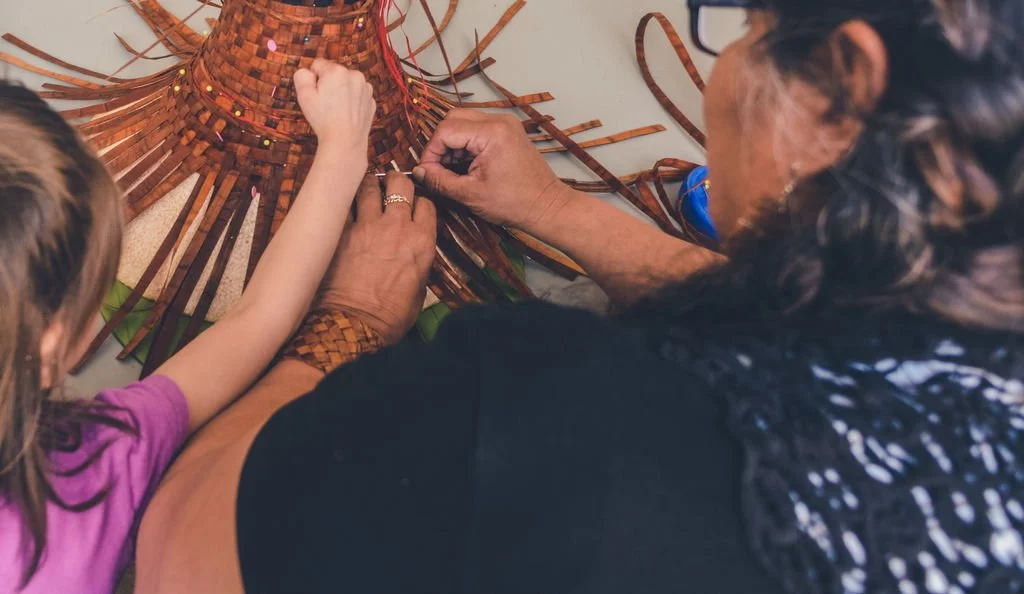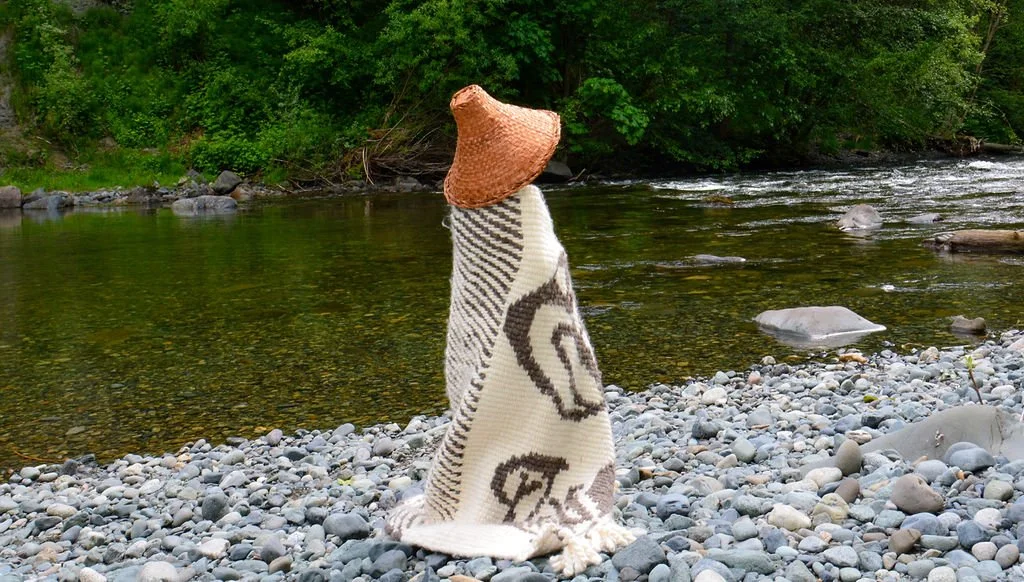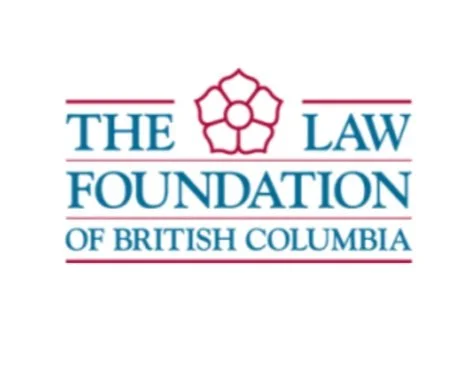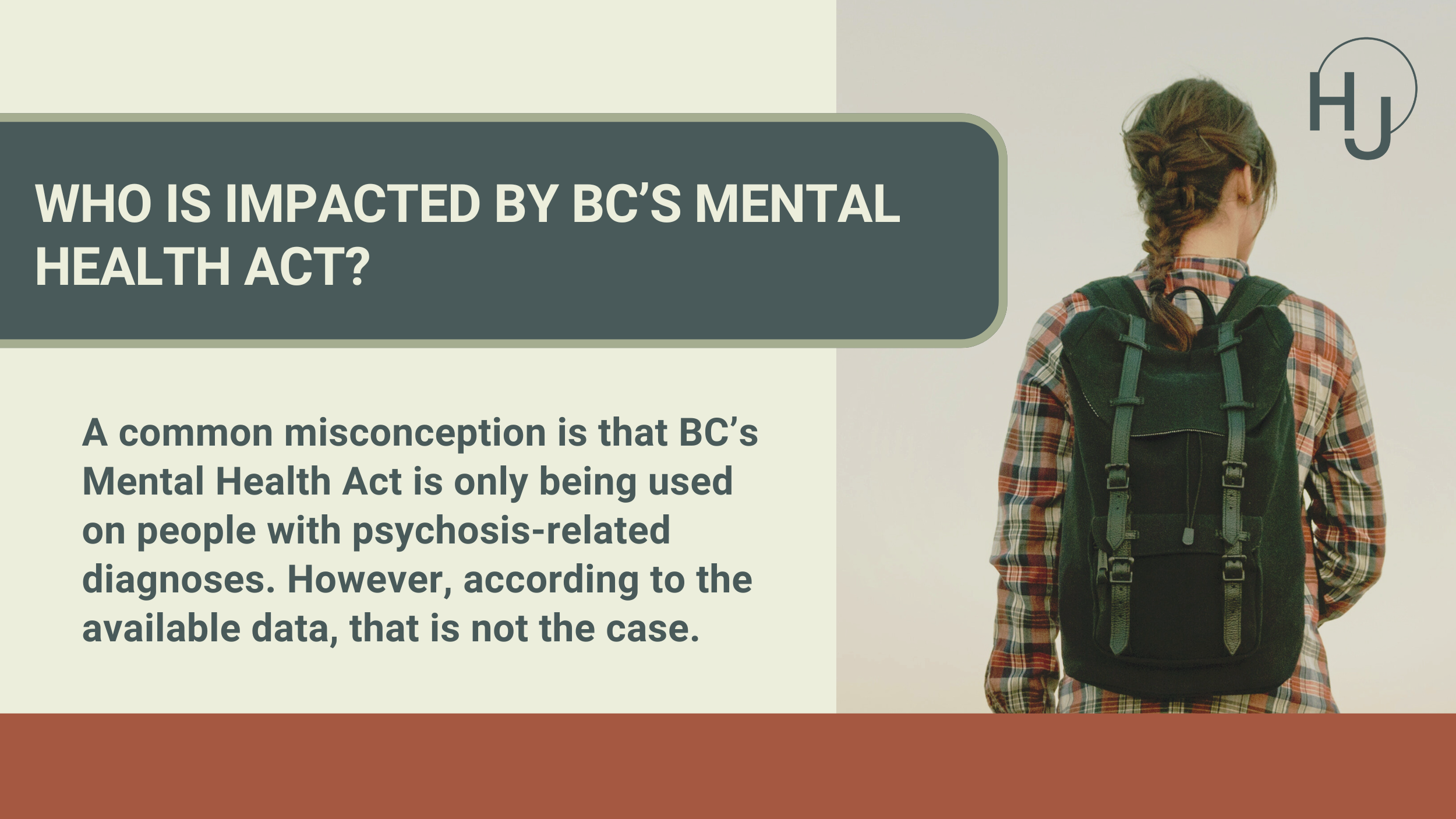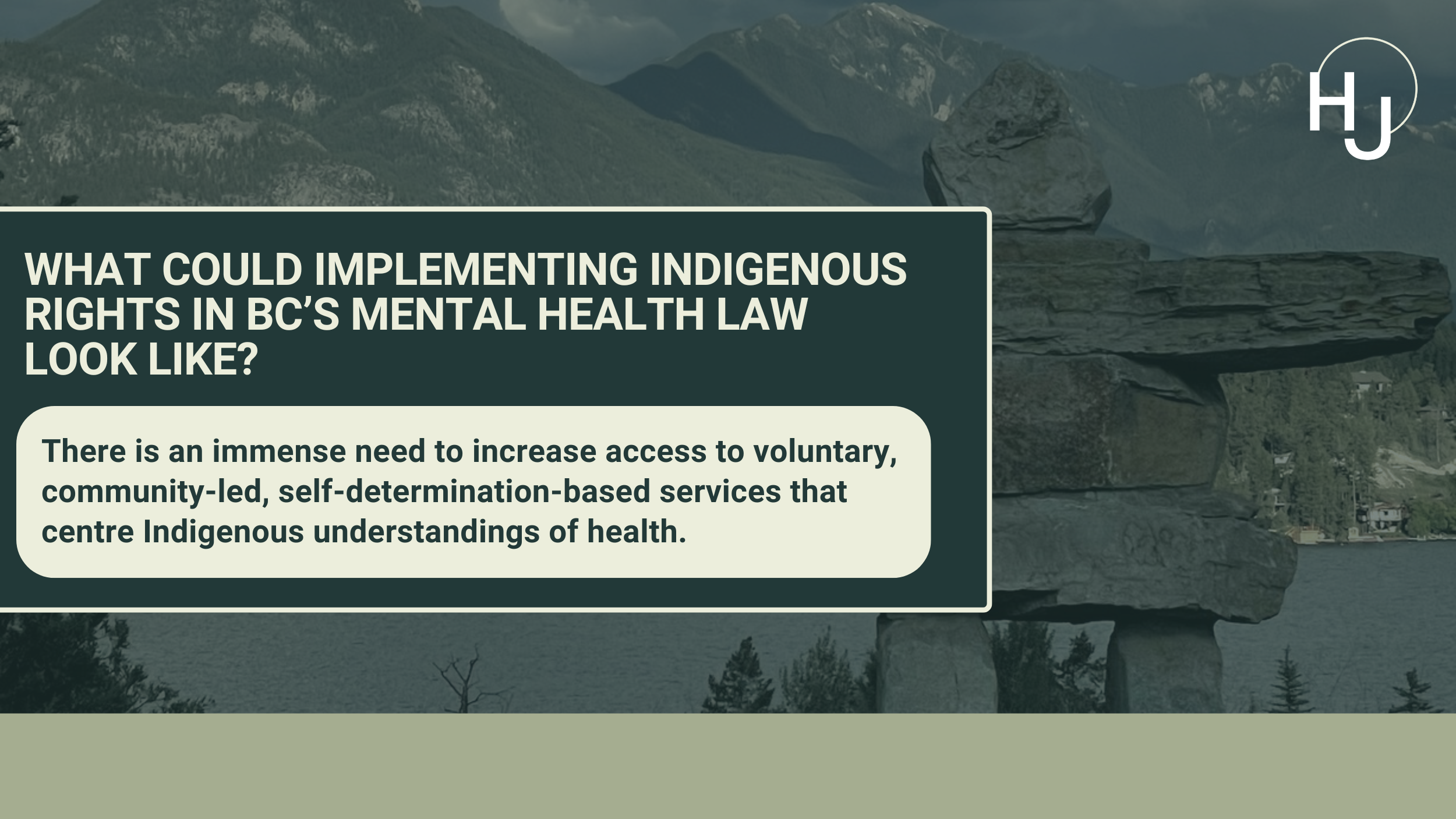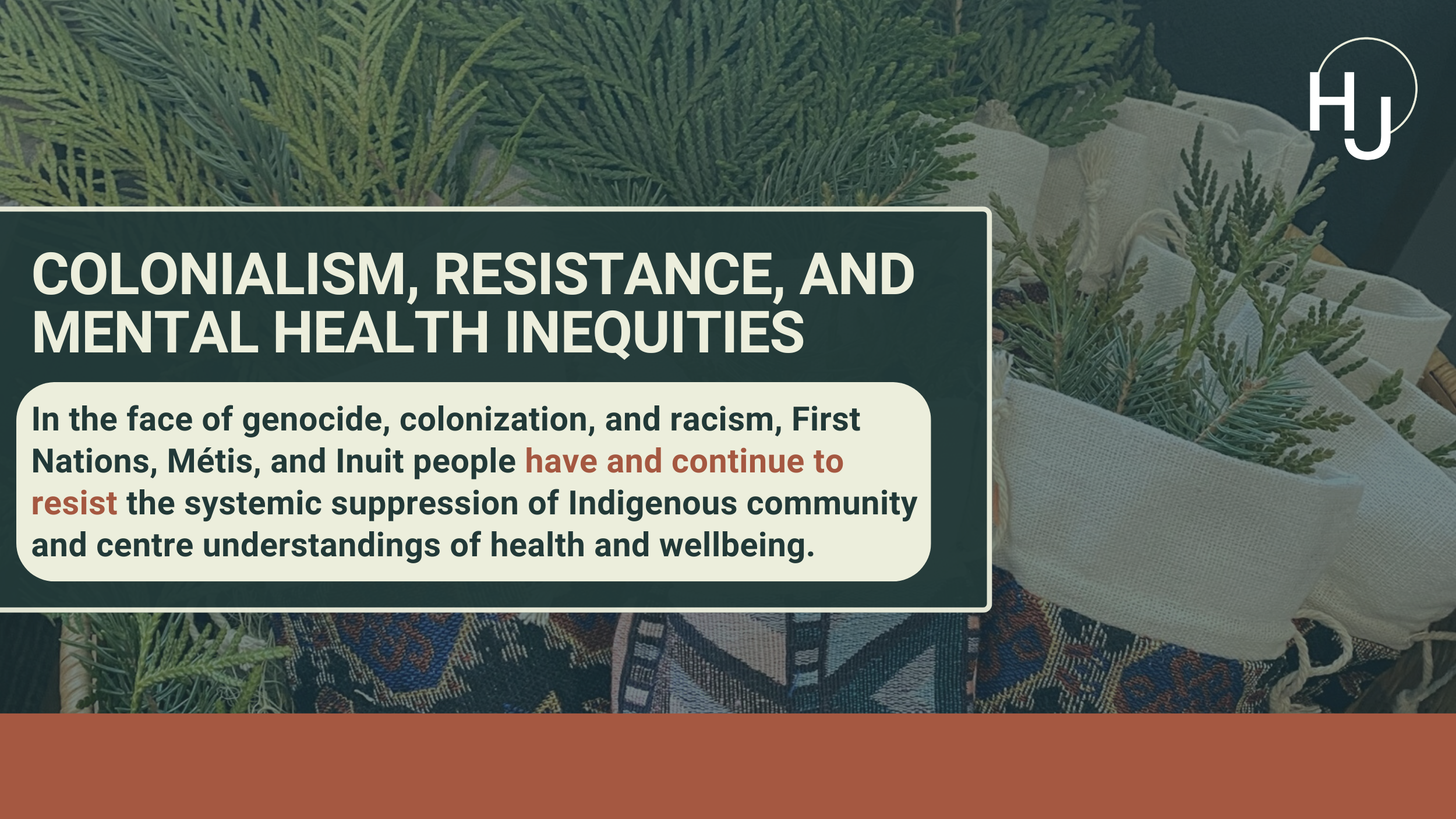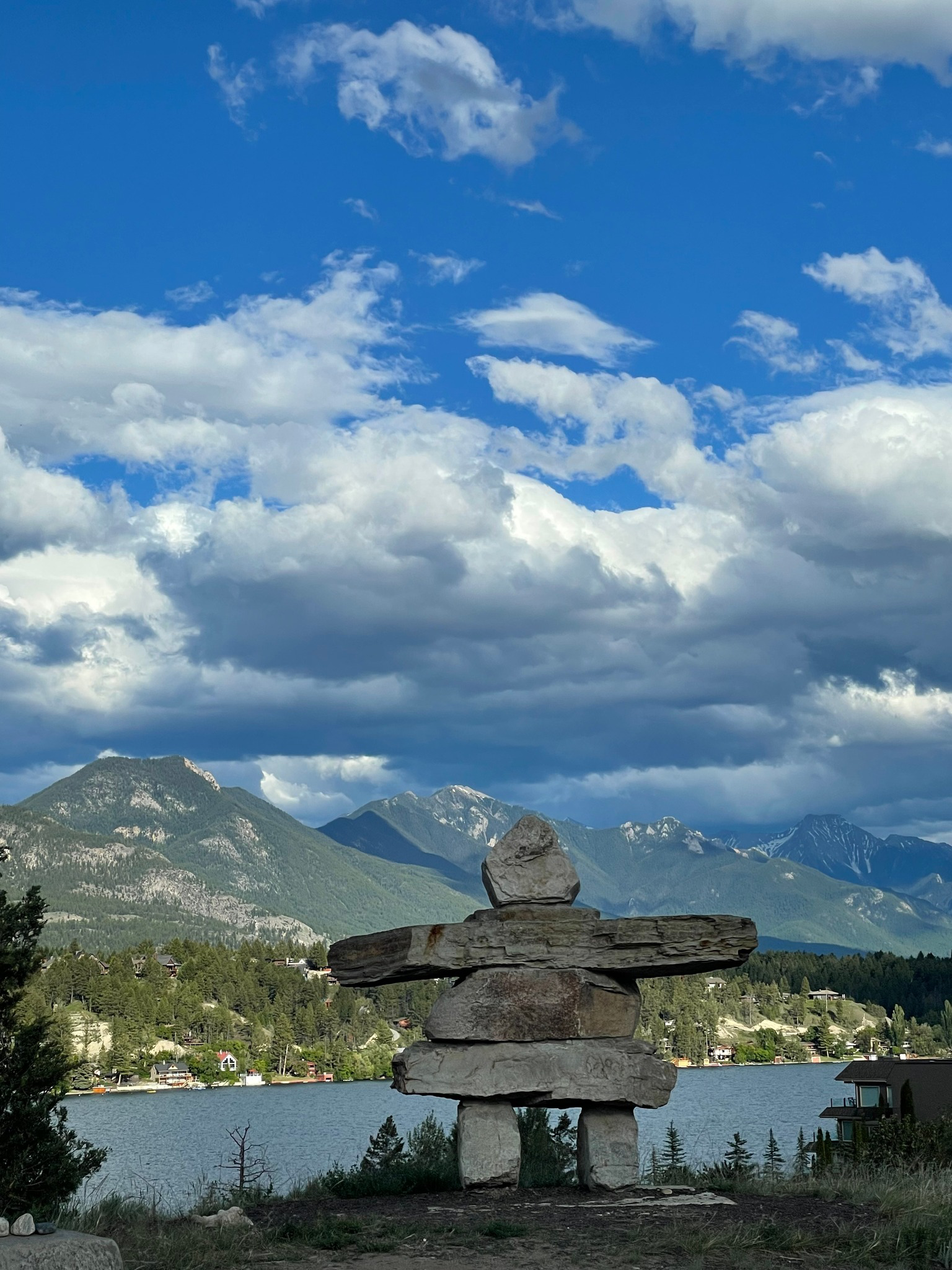
“Pathologize the systems and not the people”: Decolonizing BC’s mental health law
Below are some important summaries from the full publication. We encourage you to read the full publication for more information.
How and why we did this work
“If people don’t know, if they don’t receive the education, they won’t change.”
Photo by Bizaan Bimose (Tonya Robitaille)
-
Health Justice’s current work focuses on research, education, and advocacy in support of reforming the colonial provincial laws that govern coercive mental health and substance use treatment to better support human rights and dignity. As a non-Indigenous organization, we strive to be responsible allies and work in support of First Nations, Métis, and Inuit people and communities.
Health Justice centres the Indigenous Leadership Group as part of its governance structure to ensure that those most impacted by our work have the power to shape it. This model does not attempt to fulfill obligations regarding consultation with or consent from First Nations or Indigenous leadership organizations, including those exercising self-determination in relation to health and social services. It also focuses on colonial provincial law and does not attempt to explore Indigenous laws and practices with respect to mental wellness or community members experiencing crisis.
As a non-Indigenous organization undertaking this work, we are aware of the harmful pattern of predatory, non-Indigenous non-profit organizations co-opting reconciliation work in ways that reinforce patterns of colonialism and paternalism. We have done our best to avoid repeating this pattern by working in partnership with the Indigenous Leadership Group and by learning from Indigenous writers and experts, prioritizing their direct words and analysis whenever possible. -
One of Health Justice’s primary focus points is improving BC’s mental health law, the Mental Health Act. On this path, Health Justice staff have been meeting with the Indigenous Leadership Group since November 2020, with facilitation guidance and support from Kim Haxton (Potowatomi). We have been able to listen to and learn from the Group, and this report is intended to support Health Justice to act on the Group’s leadership and direction.
One of the requests to Health Justice made by the Indigenous Leadership Group is that we use our organizational resources to share the burden of educating non-Indigenous people, organizations, and institutions about the causes of health inequity by naming colonization and systemic racism and reiterating that the violence, intergenerational trauma, and resulting health effects of colonialism have impacted and continue to impact the health and well-being of First Nations, Métis, and Inuit people in BC. Colonization and systemic racism also impact the safety, effectiveness, and accessibility of the mainstream mental health system on an ongoing basis.
This request from the Indigenous Leadership Group that Health Justice share this burden reflects the need to ensure that the health of Indigenous people in BC is understood in its full historical and present systemic context and through the voices of Indigenous people. Failing to include broad systemic context when talking about health equity or health disparities, as often occurs, results in locating risk in First Nations, Métis, and Inuit people by erasing the impacts of genocide, colonization, and racism as well as their resistance and resilience to those systems.
-
All of the thoughts and ideas in this publication have been built upon expertise and analysis that has been shared with us by experts with direct lived and living experience of involuntary treatment and Indigenous leaders. It has helped us understand how the system is or isn’t working, recognize how people are impacted, and identify avenues for positive change. This work would not exist without that expertise.
The work is also building on a long history of advocacy and organizing related to decolonization, reconciliation, and the health system. We want to acknowledge that Health Justice did not start this work and we have had the privilege of learning from and building upon hard work already done by others who are often unacknowledged.
Health Justice staff, board members, Lived Experience Experts Group members, and Indigenous Leadership Group members live and have ties to the lands of many different First Nations. Contributors to this publication live, work, or have ties to the traditional, ancestral, and unceded territories of the xʷməθkʷəyə̓m (Musqueam), Sḵwxw̱ú7mesh (Squamish), səlilwətaɬ (Tsleil-Waututh), Lək’ʷəŋən (Lekwungen) Peoples (including the Songhees and Esquimalt), kʷikʷəƛ̓əm (Kwikwetlem), QayQayt, Sinixt, Syilx, Ktunaxa, Secwep̓emc, Okanagan, Snuneymuxw, Kwagu’ł, Dzawada’enuxw, and Wasauksing Nations, as well as Gaw Tlagée (Old Massett) Haida Gwaii.
Resistance in the face of colonization
“What are our stories? We have stories with practices in use for a long time. Bring them in to change the narrative.”
-
The over 200 distinct First Nations in BC who hold inherent title to their ancestral lands, 39 chartered Métis communities, and many First Nations, Métis, and Inuit people living away from home in communities across British Columbia hold their own unique legal orders, justice systems, well-established health practices, and concepts of health.
There is immense diversity in approaches to wellness among different Indigenous communities, but a core concept of health and wellness common to First Nations, Métis, and Inuit people is that people, earth, and everything around us are deeply interconnected and that wellness comes from holistic internal and external balance that goes beyond the absence of illness.
While the practice of longstanding, holistic understandings of wellness has been attacked and suppressed by genocide, colonization, and racism, First Nations, Métis, and Inuit people have continually resisted that systemic suppression to maintain these foundational wellness practices. These practices continue to be strong and sustaining today despite ongoing colonial interference.
-
Colonial tools, including the Indian Act, residential and day schools, and Indian hospitals, were all fundamentally designed to erode and remove self-determination. They were about breaking down systems of government and community, breaking kinship, and removing identity and community membership from community control.
Many specific colonial tools have had and continue to have direct impacts on Indigenous wellness systems by undermining traditional ways of staying well and access to health knowledge and practices. These colonial tools include:
Land theft and forced displacement from traditional territories
Interference with children, family, and community structures
Segregated, low-quality, racist health services
Violations of autonomy rooted in control and coercion.
In 2012, the Truth and Reconciliation Commission of Canada issued 94 Calls to Action to support reconciliation. Seven of those Calls to Action addressed health. To date, zero of those seven recommendations have been fully implemented.
Situating BC’s Mental Health Act
“Colonized systems define risk and safety for us. They don’t align with Indigenous community and culture.”
-
The Mental Health Act authorizes the detention and involuntary psychiatric treatment of people who are assessed as having a “mental disorder.” The Act operates within the institutional, mainstream health system and the documented racism deeply entrenched in that system.
In the face of systemic underfunding, BC has relied heavily on involuntary treatment. There are many other ways to provide access to wellness supports, or psychiatric services, to avoid the harms of the involuntary treatment system.
This is especially important because for some First Nations, Métis, and Inuit people in BC, detention and involuntary psychiatric treatment under the Mental Health Act are a continuation of the control and repression of community self-determination and traditional health practices, replacing them with government control and colonial understandings of risk and wellness. Involuntary treatment can be experienced as yet another institutional means of suppressing the autonomy of First Nations, Métis, and Inuit people and pathologizing the impacts of and resistance to ongoing colonization.
-
Exercises of power under the Mental Health Act are fundamentally about risk, whether it is risk to the safety of the person involved, risk to the safety of others, or risk that the individual’s health may deteriorate substantially.
First Nations, Métis, and Inuit people who experience being assessed for safety and risk may be subject to colonial understandings of risk that do not align with their community’s understanding. This is especially true because, in deciding whether or not to exercise power to detain and involuntarily treat someone under the Act, considerations may include an assessment of or assumptions about the person’s capacity and belief about whether they can make decisions in their own best interests and in the interests of their families and communities. Further, determinations about whether someone might be a safety risk or whether their health might deteriorate without involuntary intervention will necessarily involve an assessment of the likelihood someone will voluntarily comply with recommended treatment that might support their health.
These kinds of determinations can easily be influenced by racist stereotypes commonly applied to Indigenous people in BC’s health system, as identified in the In Plain Sight report: that they are less capable and less compliant that non-Indigenous people. Given that these stereotypes continue throughout BC’s health care system, it is difficult to imagine how they would not be reflected in any decisions to detain First Nations, Métis, and Inuit people under the Mental Health Act or the way they are treated while they are detained.
-
The Mental Health Act creates barriers to autonomy and self-determination in a number of ways. A core purpose of the Act is to control the bodily autonomy of a person experiencing involuntary treatment. The Mental Health Act removes the power of involuntary patients to make their own psychiatric health care treatment decisions. Instead, the Act empowers the facility staff to make treatment decisions on a person’s behalf through the “deemed consent” model. The Act also grants extraordinary power to facility staff to “discipline” involuntary patients, which can include the use of restraints and seclusion or solitary rooms.
In addition to removing the power of an individual to make their own psychiatric health care decisions, the Mental Health Act also excludes families and loved ones from involuntary psychiatric health care decisions. This is in stark contrast to all other health care decisions in BC, which empower the people we appoint or those who know us best to help make decisions if we are incapable of making them ourselves. For First Nations, Métis, and Inuit people who experience involuntary treatment under the Act, this means that the people who may have most familiarity with their cultural practices, and who may be able to help support access to culturally based health supports, are excluded from their care.
Family connections can also be undermined by the involuntary treatment process because, while detained, Indigenous parents may be forcibly separated from their children, and the detaining facility may control visits or phone access. In addition, a detention under the Mental Health Act may result in increased surveillance from the child welfare system or the apprehension of children.
-
When a person is detained as an involuntary patient under the Mental Health Act, the detaining facility and staff have nearly total control over not just their treatment but also their movement, activities, and daily life during detention. This includes whether a person can go outside, whether they can leave a particular hospital unit, and whether they can access any health and wellness supports outside of the treatment administered by the detaining facility staff. They may have their clothing and jewelry removed, sometimes by force, which can be elements of personal, cultural, or spiritual significance.
First Nations, Métis, and Inuit people detained in hospital might not be able to access existing services designed to improve cultural safety in the health system, like Aboriginal patient navigators or Indigenous health liaisons. They also might not be able to access the outdoors for land-based health practices because they cannot go outside, or cultural practices like smudging because it might not be permitted on locked psychiatric units. In addition, if a First Nations, Métis, or Inuit person is being held in a seclusion room, they are very unlikely to have access to any cultural supports or even visitors that can support cultural affinity or companionship.
-
BC’s Mental Health Act authorizes police to apprehend and transport a person who appears to have a mental disorder and who is acting in an unsafe manner. In rural and remote areas with inadequate community-led services, police may be relied upon as the only emergency responders available. The Act authorizes police to transport the individual to a hospital or another facility for an examination when conditions are met; in other words, the police can remove a person from their community.
When police arrive at a mental health call, they bring immense state power, a deep colonial history, an ongoing role in enforcing colonial compliance, and the ability to use state-sanctioned lethal force and violence. That history, on its own, means that the presence of police does not signify safety for many First Nations, Métis, and Inuit people and communities who are all too aware of the role police have played and continue to play in colonial policies of overcriminalization and systemic racism.
In addition, the documented systemic anti-Indigenous racism in policing in Canada is overwhelming. For many, the presence of police does not support well-being; instead, it raises legitimate fear, anger, and distrust.
Relying on police as part of the first-line mental health response reinforces stereotypes that Indigenous people who need mental health support are dangerous or threaten public safety. The presence of police can reinforce the racist stereotype that Indigenous people are a safety risk when they need health support.
UNDRIP and concrete areas for mental health law reform
“We need to be looking at the work as obligations, not recommendations.”
-
Meaningful change to address the health inequities experienced by Indigenous people and communities can seem difficult in the face of decades of inaction. BC’s mental health law and policy, like all law and policy, are rooted in foundations of colonialism and continue the cycle of health inequities.
Some Indigenous leaders in Canada have expressed some optimism at recent developments regarding the United Nations Declaration on the Rights of Indigenous Peoples (UNDRIP). BC passed the Declaration on the Rights of Indigenous Peoples Act, and Canada passed the United Nations Declaration on the Rights of Indigenous Peoples Act federally – both essentially commit to take all necessary measures to ensure provincial and federal laws are consistent with UNDRIP.
UNDRIP sets out interconnected and interdependent human rights that provide a pathway to self-determination, wellness, and equity for Indigenous people. In this way, UNDRIP can be a powerful tool to help frame the existing Indigenous-led literature on Indigenous determinants of health.
It is artificial to separate out the health-specific rights in UNDRIP for this reason given the holistic nature of health and well-being. Many of the rights protected in UNDRIP support health and well-being through protecting rights related to:
Equality and freedom from discrimination (Articles 1, 2, 15)
Community self-determination (Articles 3, 4, 5, 14, 20, 23, 31, 33, 34, 35)
Traditional and cultural health practices (Article 24)
Cultural, spiritual, and language practices (Articles 11, 12, 13, 31)
Use and stewardship of traditional territories and resources (Articles 8, 10, 25, 26, 28, 32)
Economic security (Articles 5, 12)
-
UNDRIP is not a magic bullet that will dismantle centuries of colonization and genocide, but it is an important tool that helps provide a baseline for the implementation of Indigenous rights in a meaningful way. When combined with the implementation of other human rights-based principles, BC can create a baseline for a mental health law that protects human rights and wellness for Indigenous people.
Based on the expertise and analysis shared with Health Justice from the Indigenous Leadership Group and Indigenous people with lived and living experience, we have developed action areas for the implementation of UNDRIP in BC’s mental health law.
Many of these action areas align with the provincial government’s Declaration on the Rights of Indigenous Peoples Act Action Plan, released in 2022, and its commitments to uphold the human rights contained in UNDRIP in its institutions, laws, polices, and practices.
These are some of the specific steps BC could take in reforming its mental health law:
Acknowledge colonial harms and resistance to those harms
Recognize community-specific self-determination
Rapidly expand funding for Indigenous-led services
Eliminate racism in the mainstream mental health system
Reduce or eliminate approaches that rely on use of force and control
Ensure mainstream mental health law and services strengthen Indigenous determinants of health, including connections to land, culture, identity, spirituality, language, and traditional health practices
Take meaningful action to ensure accountability and oversight
Many of these actions have already been implemented in other provinces, territories, or countries. BC can learn from other places that have started to implement UNDRIP in their mental health laws.
There will be a plain text version of this publication available soon.
Community Reflection
“This publication magnifies and exposes the truths that Indigenous people have long articulated – mental health law in BC is based on colonial concepts and perpetuates immense trauma for First Nations people and communities. In accordance with Bill 41, the Province has an obligation to align this law with the United Nations Declaration on the Rights of Indigenous Peoples and cease this centuries long cycle of carceral approaches to health and wellbeing that weaponizes racist, discriminatory, colonial beliefs and systems against Indigenous people. I call on Premier Eby and the government of BC to genuinely consider this timely publication as a guide to urgently reforming mental health law, in alignment with the UN Declaration.”
— Grand Chief Stewart Phillip
This publication was funded by the Law Foundation of BC.




